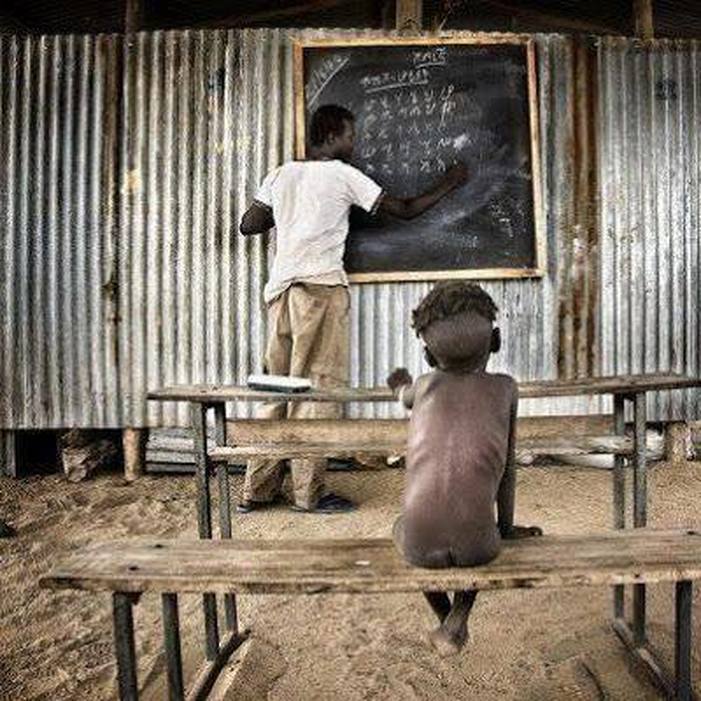"Aristotle said that poverty was the parent of revolution and crime. From my knowledge of a number of countries, that observation is pretty close to the mark.
At the turn of the New Millennium, I worked in conjunction with the children in all of the schools in Falmouth, Jamaica, which I paired with thirty two white populated Yorkshire schools back in England. The purpose of this trans Atlantic pen-pal project was to have black and white pupils from different countries learn more about each other's way of life with the aim of creating a better understanding of each culture and reducing some aspects of racism that were prevalent from both sides.
This project was sanctioned by the Jamaican Minister for Education and Youth Culture along with the Custos (Mayor) of Trelawny, Falmouth. During my participation, I visited Jamaica twice and all 32 Trelawny schools and wrote them a book about their area called, 'Bucket Bill', which raised thousands of pounds for their schools to buy basic materials. The late Nelson Mandela read this book of mine, which he subsequently praised, along with some more African and Indian stories I had written.
During my visits to these schools, the distinction between the Primary and Secondary Schools in Falmouth could not have been greater. All parents had to pay school fees to have their children educated and dress them in uniforms which they could ill afford.
Between the ages of five and eleven, the children were as good as gold for both parents and school teachers. They wrote on both sides of paper in their class with one quarter of a cut pencil and more often than not, their classroom floor was nothing more than the Jamaican soil they walked on. They seemed to smile all day long, many walked a few miles to school, they ate what their family could afford to give them (often no more than an apple between breakfast and tea time), all were eager to learn, their discipline was faultless and they required little chastisement from their teachers. If you asked them if they were happy, with one voice they would say, 'Yes' and if you asked them if they knew poverty, they would not know what you meant! Despite most families living in a tin shack and eating sparsely, no adult had yet taught their children they were poor. Consequently for the most part, they felt blessed and enriched to live in a land of sunny days and gold sandy beaches and to wake up to with mango trees in their back yards.
By the time the children entered Secondary School though, their lives would greatly change and they would quickly learn the true meaning of 'poverty' as they realised that there was no work to be had when they left school, unless it was to train as a teacher or work in an hotel for ten hours a day, being servile to white tourists for a few dollars a day wage. Very few stayed on at school beyond their fourteenth year of life. They learned that the only money they were likely to lawfully earn as a growing adult, was to become a professional beggar or a singer who might one day make it big.
The vast majority of girls allowed themselves to become sexualised too early on in life. As for the young men, toting a knife or a gun became a necessary and fashionable accessory as murders and physical assault daily surrounded them. For most, a life of crime seemed to be their only way out. The handsome looking males would spend most of their days living off older female tourists, hoping that the lonely ladies on holiday would fall in love with them, marry them and provide a passport to the west. For many of the young men and women who had to stay, some turned to pushing drugs, others to selling guns; many of the handsome Jamaican ladies found themselves living a life of vice or becoming a partner and mother to a man who was always absent from their household.
It was hard to conceive that at the turn of the New Millennium, Jamaica had more churches per square footage than any other country on earth, but also had the the highest murder rate in the world!
And before we as a society start to sit on our laurels, bear in mind that many of our young people are also growing up today with an ever increasing sense of hopelessness in the future. The majority of those who are benefit claimants feel trapped in their cushion of comfortable captivity and would prefer to work for a living wage, given the option.
Our young teenagers may not have adopted all of the Jamaican responses to perceived poverty and the absence of opportunity for the many, but mark my words, young men and women in Great Britain today have developed a deepening sense of deprivation that borders on the edge of rebellion and civil unrest." William Forde: October 12th, 2015.

